In today’s competitive business world, staying ahead of the competition is vital for long-term success. One way to achieve this is by leveraging business intelligence (BI) to gain insights into your business operations and make informed decisions. This article will explore the benefits of using BI and provide a step-by-step guide on how to implement it to stay ahead of the competition.

What is Business Intelligence?
Business intelligence refers to the technologies, tools, and practices used to collect, analyze, and present data to help businesses make informed decisions. It involves the use of data analytics, data mining, and machine learning to identify trends and patterns in large datasets.
Benefits of Business Intelligence
Using BI can provide several benefits to businesses, including:
1. Improved Decision-making
BI helps businesses make informed decisions by providing real-time data and insights into their operations. It enables businesses to identify trends and patterns in their data, which can be used to optimize business processes and strategies.
2. Increased Efficiency
By automating the collection and analysis of data, BI can help businesses save time and increase efficiency. It allows businesses to focus on other important tasks while the system handles data processing.
3. Competitive Advantage
BI can provide businesses with a competitive advantage by enabling them to make better decisions than their competitors. By identifying trends and patterns before they become mainstream, businesses can stay ahead of the competition.
4. Better Customer Insights
BI enables businesses to collect and analyze customer data, providing insights into customer behavior and preferences. This information can be used to improve customer experiences and increase customer loyalty.
Implementing Business Intelligence
Implementing BI requires careful planning and execution. Here is a step-by-step guide on how to implement BI in your business:
Step 1: Define Your Objectives
Before implementing BI, it is essential to define your objectives. Determine what areas of your business you want to improve and what data you need to collect to achieve those objectives.
Step 2: Choose the Right Tools
Choose the right BI tools based on your objectives and the data you want to collect. Some popular BI tools include Tableau, Power BI, and QlikView.
Step 3: Collect and Analyze Data
Collect and analyze data using the chosen BI tools. Use data visualization to identify trends and patterns in your data and gain insights into your business operations.
Share insights with relevant stakeholders, such as managers and decision-makers, to help them make informed decisions.
Step 5: Monitor Progress
Monitor progress regularly to ensure that the BI system is achieving its objectives. Make necessary adjustments and improvements to the system to optimize its performance.
Conclusion
In conclusion, using business intelligence is essential for businesses that want to stay ahead of the competition. It provides insights into business operations and enables businesses to make informed decisions. By following the steps outlined in this article, businesses can implement BI successfully and gain a competitive advantage.
FAQs
1. What is the difference between business intelligence and business analytics?
Business intelligence focuses on collecting and analyzing data to provide insights into business operations, while business analytics uses data and statistical analysis to solve specific business problems.
2. Is business intelligence only for large businesses?
No, businesses of all sizes can benefit from using business intelligence. There are BI tools available for small and medium-sized businesses that are affordable and easy to use.
3. How long does it take to implement a business intelligence system?
The time it takes to implement a BI system depends on several factors, such as the size of the business and the complexity of the system. It can take anywhere from a few weeks to several months.
4. What type of data can be analyzed with business intelligence?
Business intelligence can analyze various types of data, including sales data, customer data, financial data, and operational data. The data can be structured or unstructured and can be obtained from various sources, such as databases, social media, and web analytics.
5. Can business intelligence be used in any industry?
Yes, business intelligence can be used in any industry, from healthcare to retail to finance. The key is to identify the business objectives and the relevant data that needs to be collected and analyzed to achieve those objectives.